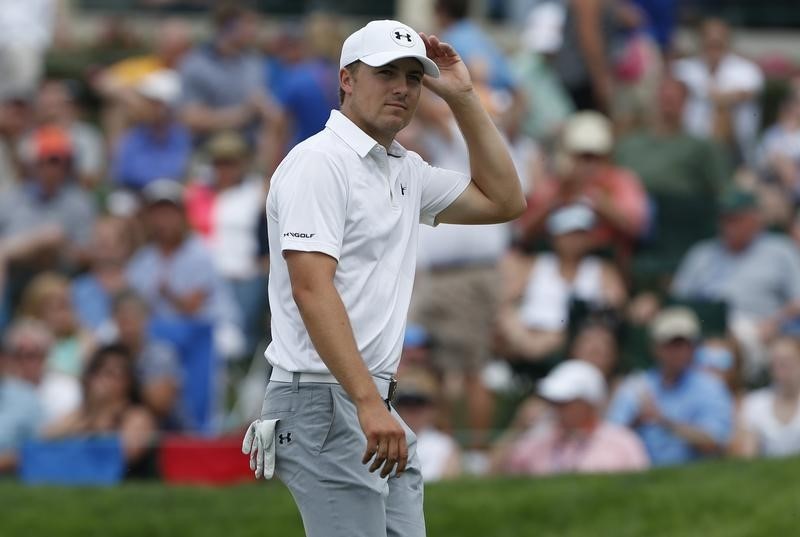By Mark Lamport-Stokes
(Reuters) - There is no shortage of compelling storylines ahead of next week's U.S. Open at Chambers Bay where the likely form of a struggling Tiger Woods is a major question mark on a links-style course that has sparked controversial debate.
Masters champion Jordan Spieth, aged 21, will spearhead a formidable challenge by an exciting crop of young guns seemingly set to dominate the game for the foreseeable future while world number one Rory McIlroy will bid for a fifth major title.
Perhaps the most heart-tugging topic heading into the 115th U.S. Open is whether or not Phil Mickelson can finally break through and win his national championship for the first time.
The American has been a runner-up at the U.S. Open a record six times, most recently in 2013 when he finished two shots behind England's Justin Rose at Merion, and he is yearning for the chance to complete a career grand slam of the four majors.
All of these varied storylines, however, will hinge on how well the players cope with the expansive Chambers Bay layout in Washington State where the vagaries of the weather will also be a major factor.
Designed by Robert Trent Jones Jr., Chambers Bay has no 'gray areas' and golfers competing in the year's second major will either love or hate the par-70 venue, which can measure anywhere from 7,200 to 7,600 yards depending on course set-up.
"I can see why the first impression isn't as favorable for some, but I think the more you play it, the more you like it," five-times major winner Mickelson said after taking his first look at the site.
"I really like it. The first time you play it, it's like St. Andrews. You don't know where to go. You don't know what mounds do what to do the ball.
"Then the more you play it, the more you like it and you appreciate it. You understand where the balls are going to go and what type of shot is the highest percentage shot."
Meandering tee boxes which are occasionally positioned on a slight slope, semi-blind shots from the fairway, fescue grass and pronounced elevation changes -- there is much to test the composure of players who have prepared as carefully as possible.
"I would contend that there is no way a player would have success at Chambers Bay unless he really studies the golf course and learns it," said United States Golf Association executive director Mike Davis.
"The idea of coming in and playing two practice rounds and having your caddie just walk it and using your yardage book, that person's done. Will not win the U.S. Open."
UNIVERSAL AGREEMENT
Those comments by Davis did not meet with universal agreement from the players.
"What's Mike Davis' handicap?" McIlroy asked with a broad grin. "You can fall into the trap of trying to over-prepare and then -- you can do all the preparation you want.
"If you don't go out there and execute the shots, all that preparation doesn't mean anything. I'd much rather have my game in good shape going in there and play practice rounds the way I usually would.
"I think that will do well for me," said McIlroy, who coasted to an eight-shot victory in the 2011 U.S. Open at Congressional with a tournament record low of 16-under-par 268.
The Northern Irishman, who won last year's British Open and PGA Championship, will be seeking his fifth major crown.
Woods, who landed the most recent of his 14 major titles at the 2008 U.S. Open, heads to Chambers Bay under a cloud of uncertainty after posting the worst score of his professional career, a 13-over 85, at last week's Memorial Tournament.
The greatest player of his generation and arguably of all time, Woods has been struggling with his game for most of this season, recording just one top-25 in five starts on the PGA Tour, a tie for 17th at the Masters in April.
While Woods, whose world ranking has shockingly plummeted to 181st, is unlikely to be a contender next week, fellow American Mickelson has displayed good form in his last four starts and no other winner would be more popular at Chambers Bay.
In 2013, Mickelson clinched the one major he had always felt was the most difficult for him to win, the British Open, with a brilliant closing round of 66 at Muirfield and his already stellar career would be made complete with a U.S. Open title.
"I'm fortunate and I'm honored to be part of that long list of great players that have won three of the four (majors)," he said.

"But I would look at my career ... in a whole different light if I were able to get that fourth one."